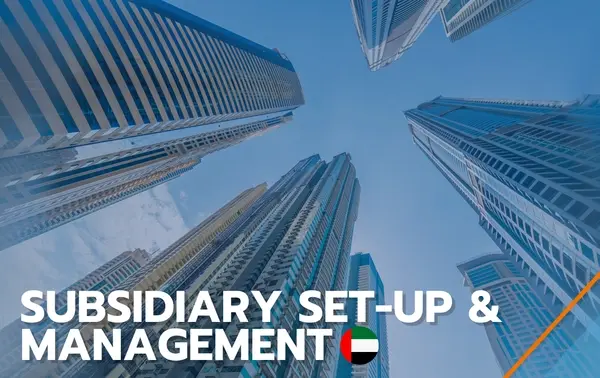What are the Business Options in the UAE?
Engaging in business/trading with the UAE from overseas offers several avenues:
1. Direct Engagement with UAE Customers/Clients: Companies can directly interact with customers or clients based in the UAE from their overseas location.
2. Utilizing a UAE Agent or Distributor: Alternatively, businesses can opt to work with a local agent or distributor in the UAE to facilitate their operations in the region.
For projects within the UAE, the following approaches are common:
1. Fly-in Fly-out Basis: For projects where a local license is not mandatory, foreign entities can operate on a temporary basis in the UAE.
2. Sub-contracting: Foreign companies can also participate in UAE projects as sub-contractors, working under the umbrella of a local contractor.
3. Unincorporated Joint Ventures: Collaboration with local or foreign partners in unincorporated joint ventures is another option for undertaking projects in the UAE.
Establishing a legal presence in the UAE entails different options:
1. Mainland UAE Presence: Companies can set up in a mainland UAE emirate to conduct business within that emirate and also outside the UAE.
2. Free Trade Zone (FTZ) Presence as an Onshore Entity: Setting up in an FTZ allows companies to operate within the FTZ and also engage in business outside the UAE.
3. FTZ Presence as an Offshore Company: Some companies choose to establish in an FTZ as an offshore entity, conducting business exclusively outside the UAE.
It’s important to note that entities operating in the UAE must possess a valid license for their specific business activities within a particular emirate or FTZ. Any expansion of operations to another emirate or FTZ typically requires additional setup and licensing procedures.
Depending on what your business aims to achieve, there are different choices available with different levels of complexity and costs for setting up and running your business. Factors to consider include the type of activities you plan to undertake, how long you plan to operate, whether you need a location in the mainland UAE or a Free Trade Zone (FTZ), licensing requirements and their costs, as well as tax implications. In simple terms, you have various options to choose from.
Below, you’ll find a detailed explanation of the difference between Mainland and Free Zone:
What is a Mainland Company?
A mainland company is simply an onshore entity registered with the relevant emirate’s government body. The Emirate’s Department of Economic Development (DED) issues its trade license. The fundamental feature of a mainland company is that there are no jurisdictional restrictions on its commercial activities. However, you may require a UAE local sponsor or agent for some business activities.
Scope of business: Inside and Outside UAE without jurisdictional limitations
Legal Type: Limited Liability Company, Sole Establishment or Civil Company, Join-Stock, Branch of a Foreign Entity, Branch of a Free Zone Entity, or Branch of a Local Entity [service license only].
Activities: The availability of activities is fully regulated by DED. Regulated activities are governed and controlled by the respective external government authorities. Approvals will be required.
Ownership: Fully dependent on the activities. 100% Foreign Ownership. Since June 2021, more than 1,000 activities can apply for full foreign ownership [only in Dubai]. A handful of mainland businesses still require 51% or 100% UAE Local sponsorship. *All other Emirates (6) still apply the 51% Local Sponsor or Local Agent requirement
Office Space: Required; Competitive real estate market with a variety of options [outside of the free zone jurisdictions]
Business Centre 12-month Lease commitment at a minimum [government certified lease agreement or EJARI is required].
Minimum initial capital: Depends on the activity. UAE Companies Law does not prescribe a minimum share capital for an LLC, but requires that a company must have a share capital that is sufficient for the activities for which it is licensed.
Recommended is AED 50,000 to AED 300,000 unpaid capital; evidence of share capital deposition on the company’s bank account is NOT required.
- AED 50,000 is the minimum share capital required by the Dubai Immigration for an Investor Visa. Share Certificate or MOA is required as a supporting document.
Visa Eligibility: Depends on the visa quota of the company applied via the Ministry of Human Resources & Emiratisation (MOHRE-Ministry of Labour)
- Additional direct application, registration and annual renewal are required with the Ministry of Human Resources & Emiratisation (MOHRE-Ministry of Labour) and General Directorate of Residency of Foreign Affairs (GDRFA-Immigration) is required
- Visa Validity of 2 years
Human Resources: Covered by UAE Labor Law, Employee’s salary are protected by Wag Protection System (WPS)
Time Frame to license issuance: 3-4 weeks
Accounting and Bookkeeping: Recommended due to the implementation of the Corporate Income Tax
Annual Filing of Statutory Requirements: Mandatory
Economic Substance Regulations (ESR): Mandatory
Double Tax Treaty: Eligible. Subject to qualifications to certain conditions.
Value Added Tax (VAT): As applicable.
- Value Added Tax (VAT) was introduced in the UAE on 1 January 2018.
- The rate of VAT is 5%.
- A business must register for VAT if the taxable supplies and imports exceed the mandatory registration threshold of AED 375,000 or USD 100,000.
*Subject to the VAT Rules and Regulations, and applicable laws
Corporate Income Tax:
The UAE Corporate Income Tax regime will become effective for financial years starting on or after 1 June 2023. The rate of corporate income tax is 9%.
- Every company in the UAE is required to register for corporate tax
- Keep proper accounting records
- File a tax return
*Subject to UAE Corporate Income Tax Law
What is a Free Zone Company?
What is it?: A free zone company is a company formed within a special jurisdiction that comes under a particular Emirate. As of now, over 40 autonomous Free Zones operating in the UAE. Free zone jurisdictions have their own regulations and have a government regulatory body called the Free Zone Authority. The Free zone Authority is in charge of trade license issuance. A UAE free zone is characterized by the benefits of 100% foreign ownership and tax concessions. A free zone company is authorized to trade only within the free zone and outside the UAE.
Scope of Business: Within the jurisdiction of the free zone and outside UAE.
Legal type: Limited Liability Company, or Branch or Representative Office
Activities: The availability of activities is fully regulated by the respective free zone jurisdictions. Regulated activities are governed and controlled by the respective external government authorities. Approvals will be required.
Ownership: 100% Foreign Ownership
Office Space: Required; Limited options within the specific free zone jurisdictions. Flexi-Desk option at a minimum
Minimum initial capital: Subject to the regulations of the respective Free Zone Authority. However, the recommendation is AED 50,000 unpaid or paid capital depending on the Free Zone Authority.
Visa Eligibility: Depends on the size of the office.Visa Validity of 2 years
MOHRE and GDRFA requirement is done via the free zone and embedded in the company set-up process. No additional process is required.
Human resources: Has independent Labor Regulations and systems but is still influenced by the UAE Labor Law
The Wage Protection System (WPS) is not enforced except in JAFZA and DMCC
Time Frame to license issuance: 5-6 weeks
Accounting and Bookkeeping: Recommended due to the implementation of the Corporate Income Tax
Annual Filing of Statutory Requirements: While not all freezone entities are required to undertake a financial audit, it is highly recommended due to the implementation of Corporate Income Tax
Economic Substance Regulations (ESR): Mandatory
Double Tax Treaty: Eligible. Subject to qualifications to certain conditions.
Value Added Tax (VAT): As applicable.
Value Added Tax (VAT) was introduced in the UAE on 1 January 2018.
The rate of VAT is 5%.
A business must register for VAT if the taxable supplies and imports exceed the mandatory registration threshold of AED 375,000 or USD 100,000.
Subject to the VAT Rules and Regulations, and applicable laws
Corporate Income Tax:
The UAE Corporate Income Tax regime will become effective for financial years starting on or after 1 June 2023. The rate of corporate income tax is 9%.
- Every company in the UAE is required to register for corporate tax
- Keep proper accounting records
- File a tax return.
*Subject to UAE Corporate Income Tax Law
Taxation in the UAE
What is Corporate Tax (CT)?
Corporate tax is a form of direct tax levied on the net income or profit of corporations and other entities from their business. Corporate tax is governed by Federal Decree-Law No.60 of 2023 Amending Certain Provisions of the Federal Decree-Law No. 47 of 2022 on the Taxation of Corporations and Businesses.
Businesses will become subject to UAE Corporate Tax from the beginning of their first financial year that starts on or after 1 June 2023.
What are the Objectives of the CT?
By introducing the CT, the UAE aims to:
- cement its position as a leading global hub for business and investment.
- accelerate its development and transformation to achieve its strategic objectives.
- reaffirm its commitment to meeting international standards for tax transparency and preventing harmful tax practices.
Who is subject to the CT?
- All businesses and individuals conducting business activities under a commercial licence in the UAE.
- Free zone businesses (The UAE CT regime will continue to honour the CT incentives currently being offered to free zone businesses that comply with all regulatory requirements and that do not conduct business set up in the UAE’s mainland.)
- Foreign entities and individuals only if they conduct a trade or business in the UAE in an ongoing or regular manner.
- Banking operations
- Businesses engaged in real estate management, construction, development, agency, and brokerage activities.
Who is Exempted from the CT?
Below are the rules regarding exemptions from the corporate tax.
- Businesses engaged in the extraction of natural resources are exempt from CT as these businesses will remain subject to the current Emirate level corporate taxation.
- Dividends and capital gains earned by a UAE business from its qualifying shareholdings will be exempt from CT.
- Qualifying intra-group transactions and reorganizations will not be subject to CT, provided the necessary conditions are met.
Additionally, CT will not apply to:
- an individual earnings salary and other employment income, whether received from the public or the private sector.
- interest and other income earned by an individual from bank deposits or saving schemes.
- a foreign investor’s income earned from dividends, capital gains, interest, royalties, and other investment returns.
- investment in real estate by individuals in their personal capacity
- dividends, capital gains and other income earned by individuals from owning shares or other securities in their personal capacity.
CT Rate
As per Ministry of Finance, CT rates are:
- 0 per cent for taxable income up to AED 375,000
- 9 per cent for taxable income above AED 375,000
- a different tax rate (not yet specified) for large multinationals that meet specific criteria set with reference to ‘Pillar two’ of the OECD Base Erosion and Profit Shifting Project.









